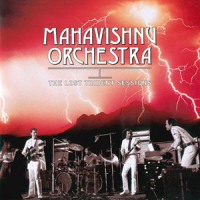Home » Jazz Articles » Album Review » Mahavishnu Orchestra: The Lost Trident Sessions
Mahavishnu Orchestra: The Lost Trident Sessions
The Lost Trident Sessions is the much-heralded studio album that never was — the follow-up to 1971’s The Inner Mounting Flame and 1972’s Birds of Fire. The group shelved the Trident tapes, opting instead to release a live album called Between Nothingness and Eternity (BNE), which contained some of the same tunes. But neither the live album nor this newly discovered session hold a candle to those first two studio classics. Sure, the playing is burning, but compositionally you can hear the band beginning to run out of ideas.
"Dream" kicks off the Trident sessions. The live version filled an entire album side and clocked in at over twenty-six minutes. This version is pared down to eleven minutes and gains some focus as a result. McLaughlin’s acoustic work toward the beginning comes across with far greater clarity than it did live. Next is "Trilogy," the three-part suite that opened BNE. Parts one and two, respectively titled "The Sunlit Path" and "La Mere de la Mer," are contrasting studies in 7/8 time. The latter is my favorite, with its ambiguous harmonic center and portentous fade-in and fade-out. Part three, "Tomorrow’s Story Not the Same," is a flat-out rocker based on two bars of four followed by a bar of six. Cobham rips it up. Keyboardist Jan Hammer’s "Sister Andrea" is the last of the three tunes that also appeared on BNE. There it began as a laid-back funk groove with a half-time feel. Here Cobham doubles the time to give the theme more forward motion; it almost sounds like something from a 70s sitcom.
The final three tracks did not appear on BNE and were never heard by the public prior to this release. They are violinist Jerry Goodman’s "I Wonder," bassist Rick Laird’s "Steppings Tones," and McLaughlin’s "John’s Song #2." Goodman’s tune is affected and Pink Floydish. Laird’s is a bit more interesting, but it rehashes some of the rhythmic and harmonic ideas heard on Birds of Fire. "John’s Song #2" is the best of the three, with its mindboggling unison lines and restless groove, and a strong violin solo by Goodman.
All in all, if you have the first two Mahavishnu records, and if you have BNE but don’t love it, you might want to skip The Lost Trident Sessions. If you’re a hardcore McLaughlin fan, you’ve already bought it and probably don’t agree.
Track Listing
Dream; Trilogy; Sister Andrea; I Wonder; Steppings Tones; John's Song #2
Personnel
Mahavishnu Orchestra
band / ensemble / orchestraJohn McLaughlin; Guitar: Jerry Goodman; Violin: Jan Hammer; Keyboards: Billy Cobham; Drums
Web: www.legacyrecordings.com
Album information
Title: The Lost Trident Sessions | Year Released: 2000 | Record Label: Columbia Records
< Previous
Almost Blue: Chet Lives
Next >
Holiday Music '99
Comments
About Mahavishnu Orchestra
Instrument: Band / ensemble / orchestra
Related Articles | Concerts | Albums | Photos | Similar ToTags
For the Love of Jazz
 All About Jazz has been a pillar of jazz since 1995, championing it as an art form and, more importantly, supporting the musicians who create it. Our enduring commitment has made "AAJ" one of the most culturally important websites of its kind, read by hundreds of thousands of fans, musicians and industry figures every month.
All About Jazz has been a pillar of jazz since 1995, championing it as an art form and, more importantly, supporting the musicians who create it. Our enduring commitment has made "AAJ" one of the most culturally important websites of its kind, read by hundreds of thousands of fans, musicians and industry figures every month.



















